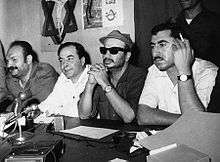Kamal Nasser
| Kamal Nasser | |
|---|---|
| Born |
Kamal Butros Nasser 1925 Bir Zeit |
| Died | 9 or 10 April 1973 |
| Nationality | Palestinian |
| Alma mater | American University of Beirut |
| Occupation | Political scientist |

Kamal Butros Nasser (Arabic: كمال ناصر; l925 – 9 or 10 April 1973) was a Palestinian political leader, writer and poet.
Early life
Nasser was born in Bir Zeit in 1925 to a Palestinian Christian family.[1] He was educated at Bir Zeit school (now Bir Zeit University). Then he studied political science at the American University of Beirut and graduated in 1945.[1] Later he worked as a teacher while studying law in Jerusalem. In the period following the 1948 Arab-Israeli War, Nasser worked as a journalist.
Political life
He was responsible for producing the al-Ba‘ath newspaper from Ramallah and also set up al-Jil al-Jadid (The New Era), a militant newspaper. In 1956 he was elected to Jordanian parliament as Ba‘ath member for Ramallah district. He did not serve out his term as a result of his expulsion from Parliament during the subsequent martial law period in Jordan. Expelled from West Bank by Israel in 1967, Nasser became editor of the PLO newspaper, Filastin al-Thawra. In addition, at that time he became a member of PLO Executive Committee from February 1969 to July 1971 serving as an official with the office of National Guidance. In 1970, he was also spokesman for the committee.[2] In addition, he served as spokesman for the PLO.[3]
Death
Nasser was assassinated in West Beirut by Israel Defense Forces in the 1973 Israeli raid on Lebanon (Operation Spring of Youth) on the night of 9 April 1973. Israeli forces also killed Kamal Adwan and Mohammed Yousef Najjar in the same attack.[4] One of the soldiers involved was reportedly Ehud Barak, dressed up as a woman, who later became prime minister of Israel.
Legacy
The main auditorium of Birzeit University is named after him.
Works
Kamal Nasser was a published poet and a number of his poems have been translated into English, including The Story and The Last Poem.[5]
References
- 1 2 "Kamal Nasir (Kamal Butros Nasir)". Web Gaza. Retrieved 16 December 2012.
- ↑ "Hawks threaten to leave government if peace proposals are accepted". Ludington Daily News. UPI. 29 July 1970. Retrieved 16 December 2012.
- ↑ "Troops strike". Gadsden Times. 10 April 1973. Retrieved 16 December 2012.
- ↑ Jensen, Holger (11 April 1973). "Beirut incident daring Mideast exploit". Times Daily (Beirut). AP. Retrieved 16 December 2012.
- ↑ http://www.poemhunter.com/kamal-nasser/poems/
|